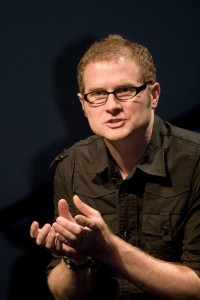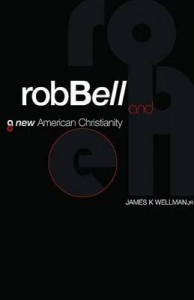Book Review: Rob Bell and a New American Christianity

Writing on the topic of Rob Bell always seems to bring out a lot of passion and opinion in people. After I did a review on Rob Bell’s book Love Wins, I guess I shouldn’t have been surprised then when I received a bunch of comments, both spoken and written, either supporting Bell or declaring him a heretic. One friend even admitted he liked to read Bell but had to keep secret about it at church.
Others came up to tell me they were still trying to process Love Wins and wondering if anybody would like to get together to just talk. It rather reminds me of Nicodemus who was the religious leader that had to come to Jesus in secret to say, “Tell me more about these things you are teaching.”
Reading James K. Wellman’s book Rob Bell and a New American Christianity I was struck by the fact that I possibly got more out of a book about Rob Bell than a book by Rob Bell. The book helps answer the question of ‘how does one go from being a traditional mid-west conservative Evangelical shaped by a Reformed religious tradition to one of the most cutting edge Christian ministers in the world today?’ One who even registers on the secular media’s radar by being named one of the top 100 Most Influential People in the world by Time magazine.
And even more astounding is how he was able to accomplish this from Grand Rapids, Michigan?
Adding more to this enigma is that although Bell is a highly charismatic figure he took great pains that joining his group should be the result of a transformative experience with Jesus and people telling their friends about it that brought people to Mars Hill Church and not slick marketing advertising. No signs marked the church, you had to KNOW where it was because someone brought you. Despite this eschewing typical strategic marketing Mars Hill Church grew to more than 10,000. Additionally Wellman adds:
Bell took no degrees or titles, and perhaps more pointedly, built no more buildings. Under Bell. Mars Hill gave more than a quarter of what they took in through their ‘joy boxes’ twice as high as the average megachurch in the nation.
The book suggests that what drives many young evangelicals to respond so positively to Bell’s teaching is his enthusiastic acceptance of questioning. Many young Christians have either failed to see the promised fruit of their faith or wonder why there seems to be such a huge discrepancy between what they had been taught growing up and what Jesus seemed to be really concerned about.
“Bell’s sermons and various teachings create a rich field of inquiry into the Christian faith that celebrates thought, questions, and doubts about the deepest aspects of faith and scripture. Bell displays to his listeners a bold, and what they would call a ‘courageous’ exploration of faith and the Bible.”
Although Wellman clearly is an admirer of Rob Bell, the book does detour into some noteworthy missteps made by Bell particularly his ‘over the top’ critique of other churches in his 2008 book Jesus wants to Save Christians. It was during this time that Bell moved his family into a poor and crime ridden area of Grand Rapids to live out what he was teaching. The book infers that this was a less than successful venture that took its toll on Bell’s family and was abandoned after two years.
Rob Bell and a New American Christianity culminates with the unpacking of Bell’s theology found in his 2011 book Love Wins and the fallout over it in the evangelical community. His skirting the edges of universalism (the doctrine that suggests that eventually all people will be “saved”) led to the now famous tweet by John Piper that simply said, “Farewell Rob Bell”.

Throughout the book the desire for Bell to shun labels becomes apparent. Although many think he is part of the “emergent church” community he has distanced himself as much from them as from any other stream in Christianity. Although the conservatives see him as a post-modern liberal, he focuses too much on Jesus and the resurrection to be recognized in that stream. To the conservatives, he’s too liberal and for the liberals, he’s too conservative. Evangelicals declare he is a Universalist but the Universalists say he’s not.
(Actually I think the evangelicals would be happy if their people would just stop reading his books and sneaking off to hear him speak)
In the end, Rob Bell and a New American Christianity reveals a man who sees God as the master storyteller and is calling all that would listen to be part of the story of reconciling heaven and earth so that they are brought together again.
Someone asked me recently what I thought of Rob Bell. I said, “I may not agree with every nuance of his teaching, but where he is taking Christianity is the direction I am much more interested in going.”
